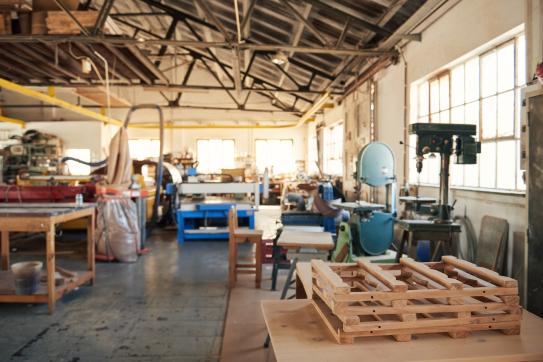Whenever doctoral student Kylie Jiwon Hwang needed a boost of inspiration during her four years of research on entrepreneurship and the formerly incarcerated, her thoughts would return to the people she interviewed as part of the project.
“I was always struck when I would talk to formerly incarcerated entrepreneurs, with how driven and committed they were to their new ventures,” Hwang says. “You see that in a lot of entrepreneurs, but with them it was something more.”
Hwang’s latest paper, co-authored with Damon J. Phillips, the Lambert Family Professor of Social Enterprise, finds that for the formerly incarcerated, entrepreneurship has emerged as a viable option for those seeking work after being released, especially given the likelihood they will face discriminatory hiring practices. The paper has won several awards and is undergoing peer review to be published in an academic journal.
Hwang and Phillips used data from the Bureau of Labor Statistics’ National Longitudinal Survey of Youth to determine that formerly incarcerated individuals are more likely to become entrepreneurs, when compared to those who have never been imprisoned.
As their paper notes, as of 2018, formerly incarcerated people in the US have an unemployment rate of 27.3, compared to what was then 5.8 in the general public. A key driver of disparity is that formerly incarcerated people are less likely to be hired by employers, and are more likely to earn lower wages and have lower wage mobility.
The United States is also the world leader in the number of people it incarcerates, with 2.3 million people in prisons—roughly the population of Houston. More than 600,000 people are released from prison each year and two-thirds of them will be rearrested within three years of returning to society.
Hwang and Phillips’s research also finds that although formerly incarcerated people, especially those who are Black, are often pushed into entrepreneurship by discrimination, their ventures ultimately tend to result in higher incomes and lower recidivism rates.
The study is, according to Hwang, the first of its kind to put the entrepreneurial option for the formerly incarcerated in the context of discrimination.
“We think that this could have policy implications to suggest viable routes formerly incarcerated people could take,” Hwang says. “Perhaps it could help increase entrepreneurial training within prisons.”
Admitting it was a slightly unorthodox topic to research in a business school, Phillips says the two began their study with an open mind.
“We started with this as a question, because there are reasons to believe that entrepreneurship isn’t the right thing for the formerly incarcerated,” Phillips says. “Entrepreneurship is hard for anybody, but maybe it was even harder for someone who has been to prison, especially if they are Black.”
What intrigued both Hwang and Phillips is that the answer to their query was not obvious, although there is active discussion on how formerly incarcerated people can overcome labor-market discrimination, and whether entrepreneurship is a viable career path for people who face labor-market discrimination in general.
Hwang and Phillips used the data from the National Longitudinal Survey of Youth, which followed roughly 9,000 individuals over the course of 20 years, to achieve a scale in their results as well as interviews to gain more depth, details, and insight that are sometimes hard to determine from data alone.
According to their data, most formerly incarcerated entrepreneurs open businesses that do not require much human and financial capital— service-industry jobs such as barbershops and cleaning services, though the researchers did interview some who had founded construction companies and other larger businesses that employ numerous workers. Also, the research shows that formerly incarcerated entrepreneurs also hire, on average, five people.
“They face the same challenges that every entrepreneur faces, getting financing and funding, but on top of that they have a criminal record,” Phillips says. He notes that most of the entrepreneurs they interviewed received funding from friends and family, an essential element of launching a business that is harder for those who have spent time in prison.
Plus, hanging above it all, there is the stigma that comes with having served time in prison, which makes it difficult to secure more formal financial backing.
But once launched, those entrepreneurial ventures tend to, on average, earn more for the formerly incarcerated entrepreneur than traditional employment would.
“The formerly incarcerated who do find employment often do not find great jobs,” Hwang says. “They are often short-term or low-paying jobs. Entrepreneurs seem to, on average, help mitigate the income gap they would see with non-incarcerated people.”
The study also considers the effect on entrepreneurship of “Ban the Box,” a catch-all term for legislation that bars employers from conducting criminal background checks until later in the hiring process. It indeed finds that formerly incarcerated people are less likely to start their businesses in jurisdictions that have implemented “Ban the Box,” indicating that the policy mitigates post-incarceration discrimination.
Hwang and Phillips note that they do not claim that entrepreneurship should be the only option pursued by the formerly incarcerated.
“Employment should be the main route for people to reenter society,” Hwang says. “We like to think our research can help introduce entrepreneurship to some people as another option.”
Phillips points out that for the formerly incarcerated, entrepreneurship can be essential to building a community and can provide the boost of confidence essential for people who are, in many cases, starting over.
“In each case, whether it’s employment or entrepreneurship,” Phillips says, “somebody believed in them.”
Professor Damon J. Phillips is the leader of the ReEntry Acceleration Program (REAP), which trains MBA and EMBA students to teach business courses for incarcerated and formerly incarcerated people, and develops tools for potential employers and forums to dramatically improve post-incarceration employment and entrepreneurship.
